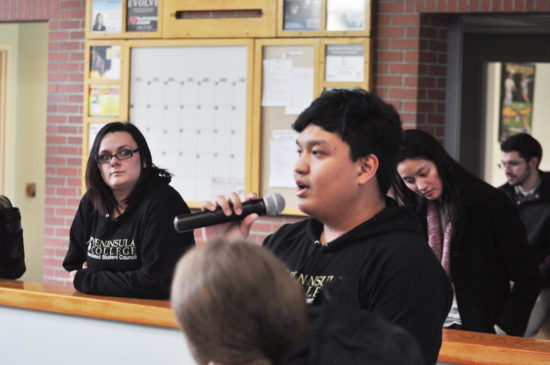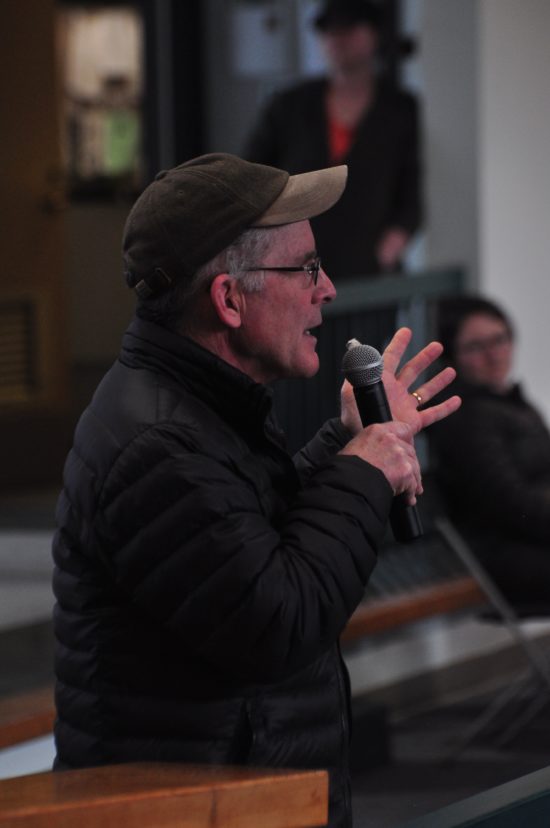

Photos and story by Ryan Fournier
“I am really taken aback by the stats of school shootings in the US,” said Hazim Rosli, director of clubs and organizations for the Associated Student Council at Peninsula College. Rosli is from Malaysia, where obtaining a gun is nearly impossible.
PC President Luke Robins said he hoped the conversation would focus on what could be done at the College, rather than broader socio-political conundrums, at the “School Gun Violence Forum” in the Pirate Union Building on Feb. 28.
“We’re not going to solve this problem today,” said Bonnie Sires, ASC vice president. The Council organized the Forum to collect student and community feedback on school safety, to inform its work as student leadership.
The Forum aired idea of arming teachers, though no plans to do so are in place at PC.
“That would be a legislation change,” explained Campus Safety Operations Manager Marty Martinez. He explained that even security on campus is not permitted to carry firearms.
Senate Bill 6622, recently introduced in the Washington State Legislature, would allow school administrators and some teachers to carry guns.
“I can tell you that the opinion of faculty on this issue is widely divided,” said English Prof. Janet Lucas, the Forum’s moderator. Though some teachers support the idea, others would retire immediately if arming teachers became policy, she said.

Cathy Engle, associate dean for student success, spoke about PC’s Concern Assess Respond Evaluate Team, which responds confidentially to personal troubles on campus. Engle said the CARE Team might identify a potentially dangerous person by piecing together various reports about them.
And, in addition to its on-staff mental health counsellor, the College is partnered with Peninsula Behavioral Health, which offers more extensive services to students in need, Engle said.
Martinez spoke of Campus Safety’s intention to increase camera surveillance “thoughtfully” at PC, though Robins said no plan for camera expansion is in place.
Martinez said his office hopes to produce an instructional film for students, based on the “run-hide-fight” model used at other schools to prepare students to survive shootings.
Last summer, Campus Safety performed an “active shooter” drill on campus with police, firefighters, Border Patrol, Homeland Security, US Parks, and tribal entities.
Port Angeles Police Chief Brian Smith said Campus Safety can talk with his department in real time on the police radio channel. He spoke of creating a non-conducive environment for campus shootings with measures like random visits by uniformed officers.
Carolyn, a business owner who requested anonymity for fear of “trolls,” said she didn’t think schools recently targeted by shooters were conducive to violence. The problem, she said, is the available weapons.
She’s organizing a “die-in” demonstration, to take place outside an annual National Rifle Association fund raiser at the Vern Burton Center in Port Angeles.
Participants will meet “near” the William Shore Pool at 4:45 p.m. on March 10, and proceed to the fundraiser, where they’ll play dead on the ground on the lawn outside the center.

“Let’s make a clear statement that the current extreme positions of the gun lobby are in direct contradiction to making our communities safer,” states the event flyer.
Student Evan Drescher said that, while most automatic weapons should be banned, those under certain fire rates or calibers should be legal to purchase. He’s in favor of the comparatively broad gun-ownership rights Americans have, and said that automatic weapons would be mostly for recreation.
Though many have called for expansion of background checks for gun owners, student Zach Spriggs said that wouldn’t solve the problem. He said there should be a law forcing local police to submit more criminal information to the FBI, so background checks are more informative.
Robins, who was unable to attend the Forum due to an administrative meeting in Forks, said there have been no threats of mass violence at PC while he’s been around, that he’s aware of.
He said the College plans for events like shootings, fires, and earthquakes, but its goal is to be open.
“The last thing we want is to build a wall around our campus,” the president said. He explained that with an open atmosphere comes an accepted risk, like any public place.
